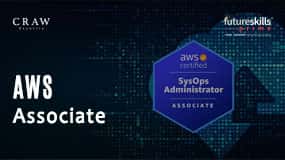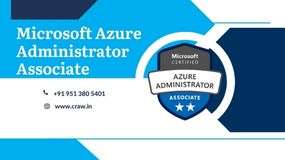Microsoft Azure Fundamentals Training & Certification (AZ-900)
February 19, 2023 2025-07-02 16:18Microsoft Azure Fundamentals Training & Certification (AZ-900)
Get Microsoft Azure Fundamentals Training & Certification (AZ-900)
Bestseller
2000+ Student Reviews
Microsoft Azure is a system and architecture for cloud computing that was developed by the company for use in developing, installing, and controlling applications and services across worldwide data center network centers. In addition, it offers software as a service (SaaS), platform as a service (PaaS), and infrastructure as a service (IaaS), and it supports a wide range of programming languages, tools, and frameworks, including both systems and programs made by Microsoft and those made by third parties.
- Course Duration : 40 Hours
- Language : Hindi | English
- Course Delivery : Online | offline
Book a Trial Demo Class
Training Available 24*7 Call at 9513805401
Get Microsoft Azure Fundamentals Training & Certification (AZ-900)
The world is witnessing a significant transition as it becomes a place completely populated by internet-based gadgets capable of carrying out particular activities for the benefit of humanity. Because of this, the majority of users’ private information is stored on memory chips in the Internet of Things (IoT) that are directly connected to cloud servers. This makes it highly vulnerable to hacking by professionals using black hat techniques.
Because our very sensitive information is stored on digital assets that we cannot afford to let fall into the wrong hands, we must be extremely secure against any illegal hacking incidents that may occur.
Additionally, Microsoft Azure is working on its behalf to verify that it offers highly operational knowledge through the Microsoft Azure Fundamentals Certification AZ-900 in very specific conditions, assisted by top tech leaders providing in-the-moment instruction from Craw Security, the Best Cybersecurity Training Institute in India.
Book a Trial Demo Class
Training Available 24*7 Call at +91 9513805401
Microsoft Azure Fundamentals Course Content
- Compute Services
- Storage
- Why Use Azure
- List the benefits of using Microsoft Azure.
- How does Azure work
- Why use Azure
- Why do we need Azure
- What is Cloud Computing?
- Cloud Computing benefits
- Terminologies and key concepts
- Economies of scale
- OpEx vs CapEx
- Cloud models: Public, private, and hybrid cloud
- Characteristics of cloud models
- IaaS, SaaS, and PaaS
- Use cases of IaaS, SaaS, and PaaS
- Shared responsibility model of cloud models
- Introduction
- Azure regions
- Region pairs
- Region-wise feature availability
- Availability zones and sets
- Resource groups
- Azure Resource Manager
- Azure products and core services
- Azure Compute
- Azure virtual machines (VMs)
- Containers and virtual networks (VNets)
- VPN Gateway and Azure Load Balancer
- Azure Application Gateway
- Content delivery networks (CDNs) of Azure
- Working of CDNs
- Storage services of Azure
- Structured, unstructured, and semi-structured data
- Types of Azure Storage accounts
- Azure Storage account: Blob
- Database services of Azure
- Azure Marketplace and Azure SQL
- Internet of Things (IoT)
- IoT Hub
- Azure Big Data and SQL Data Warehouse
- Azure Analytics and Data Lake Analytics
- Azure HDInsights
- Machine Learning
- Services and Studio of Azure Machine Learning
- Server-less computing
- DevOps concepts
- Management tools of Azure
- Developing resources: Using Powershell, Azure CLI, and Cloud Shell
- Deployment using JSON
- Azure Advisor
- Introduction
- Azure Firewall
- Azure DDOS
- Groups of network security
- Groups of application security
- AuthN and AuthZ
- Active Directory of Azure
- Multi-factor authentication
- Security center and key vault of Azure
- Azure Information and Advanced Threat Protection
- Azure Policy
- Role-based Access Control (RBAC) of Azure
- Azure locks and blueprints
- Governance of subscription
- Azure tags and monitoring
- Azure Service Health
- Terms and requirements of compliance
- Privacy statement and trust center of Microsoft
- Service Trust Portal
- Azure subscriptions
- Management groups
- Available options for purchasing Azure product and services
- Usage of metrics
- Costing factors
- Zones for billing concepts
- Pricing calculator of Azure
- Azure’s total cost of ownership (TCO)
- Cost minimization techniques in Azure
- Azure support plans and cost management
- Service level agreements (SLAs)
- Composite SLAs
- Making improvements in Application SLAs
- Offering feedback and general availability
- Announcements, updates, and roadmaps of Azure
Talk to Our Course Advisor
Introduction to Azure Fundamentals
The Microsoft Azure Fundamentals Certification is a foundational certification exam that assesses a candidate’s knowledge of cloud computing principles and Microsoft Azure functionality. Those who wish to understand cloud computing in general and Azure in particular, including its prices, support, and cloud concepts, should also take the Azure Fundamentals Certification.
The Azure Fundamentals Exam covers cloud techniques, important Azure services, pricing, and support in addition to the fundamentals of cloud security, privacy, compliance, and trust. It is recommended for both novice users of cloud computing and experts who wish to refresh their knowledge of Azure and the cloud.
Choose Your Preferred Learning Mode

Classroom Training
We offer customized VILT (Virtual Instructor-Led Training) sessions at your convenient hours to provide effortless training.

Online Training Class

Corporate Training
Hire a preferred trainer at your work premises at your chosen time slots and train your employees with full efficiency.
Microsoft Azure Fundamentals Course Description
Craw Security provides a legitimate Microsoft Azure Security training program that covers all subjects included in the AZ-900 exam as exam prep. In addition, the course has sections on networking, computation, storage, and Azure services. In order to give you practical Microsoft Azure Fundamentals Virtual Training for providing you with hands-on Azure experience, the course also contains labs.
Moreover, there are other tools accessible outside of the official course, such as study aids, mock tests, and online forums where you may ask questions and obtain professional help.
Once you are assured of your understanding, you can take the AZ-900 exam, which consists of 40–60 multiple-choice questions and lasts 60 minutes. For the exam to be passed and for you to receive your certification, you must receive at least 700 out of 1000.
There are numerous Microsoft Azure Certification Paths available, covering a wide range of professions and ability levels. Additionally, the best certification path for you will depend on your current level of Azure knowledge as well as your career goals. Additionally, the following list includes some of the most popular Azure certification pathways:
Course | Description |
Azure Fundamentals (AZ-900) | This credential gives a basic understanding of cloud computing and Azure services and is the entry-level certification for Azure. |
Azure Administrator Associate (AZ-104) | This particular credential is intended for individuals who must configure, administer, and protect Azure resources as well as those who manage and monitor Azure services. |
Azure Developer Associate (AZ-204) | Professionals who create cloud solutions using Azure technologies like Azure Functions, Azure Cosmos DB, and Azure Web Apps are the target audience for this credential. |
Azure Solutions Architect Expert (AZ-303 and AZ-304) | Individuals that build and implement Azure-based solutions should choose this certification path. It covers data management, networking, security, and architecture-related abilities. |
Azure DevOps Engineer Expert (AZ-400) | The people who create and implement DevOps methods utilizing Azure technologies, including Azure DevOps, Docker, and Kubernetes, are the target audience for this certification. |
Azure Security Engineer Associate (AZ-500) | Professionals who handle security measures on Azure and apply security measures are the target audience for this certification. |
The following are some advantages of earning the Microsoft Azure Fundamentals Certification (AZ-900):
- Demonstrating a basic understanding of Azure and cloud computing
- Enhancing employment chances
- Studying Azure’s support and pricing
- Laying the solid groundwork for future Azure certifications
- Access to Microsoft resources
Craw Security's Students Awarded



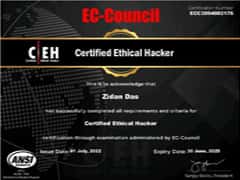
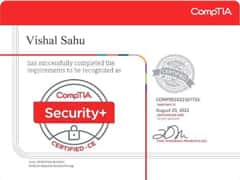
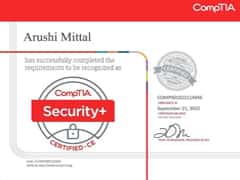

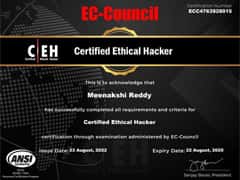


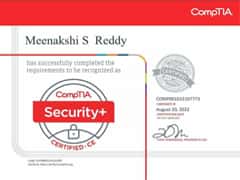
Related Courses
What People Are Saying About Craw Security
Google Review (2000+) ★★★★★






About Microsoft Azure Fundamentals (AZ-900) Frequently Asked Questions
Microsoft Azure is a system and architecture for cloud computing that the company developed for use in developing, installing, and controlling applications and services across worldwide data center network centers. In addition, it offers software as a service (SaaS), platform as a service (PaaS), and infrastructure as a service (IaaS), and it supports a wide range of programming languages, tools, and frameworks, including both systems and programs made by Microsoft and those made by third parties.
Some of the primetime benefits of using Microsoft Azure are as follows:
- Scalability
- Cost-Effective
- Global Presence
- Security
- Integration with other Microsoft products
- Availability
- Flexibility
An Azure subscription is essentially a Pay-as-you-go cloud service offered by Microsoft Azure that gives customers access to virtual machines, storage, and web applications. Furthermore, distinguished users can oversee and administer every one of their Azure services from one central area. Additionally, quota settings, usage monitoring tools, and access limitations are available to Azure service subscribers.
Azure services are hosted in Azure regions, which are actual places on the globe, which are called data centers. In this regard, these corresponding data centers have the option to host their apps close to their users for the greatest performance. Moreover, customers can deploy apps in any area for high reliability and to satisfy data residency requirements thanks to Azure’s global architecture.
Azure Resource Manager (ARM) is a management solution for allocating, managing, and organizing resources in Microsoft Azure. It also provides a way to organize and manage Azure resources, such as storage accounts, virtual machines, and network connections.
Azure Virtual Machines (VMs) are a cloud computing infrastructure provided by Microsoft Azure. Additionally, they allow you to create and manage virtual machines in the cloud, providing you with a reliable and flexible infrastructure to run your apps and services.
Azure Storage is a cloud-based storage product provided by Microsoft Azure. It provides incredibly robust and scalable cloud storage for both organized and unstructured data.
An element of Microsoft Azure is the Azure App Service platform, which allows you to develop, build, and expand web and mobile applications. With Azure App Service, you can quickly create and implement applications using popular programming languages and frameworks, such as Java, .NET, Node.js, Python, and PHP.
A relational database service offered by Microsoft Azure is called Azure SQL Database. With features that let you store and administer your information in a database by utilizing the Microsoft SQL Server engine, it offers a fully maintained, extensible, and encrypted data model in the cloud.
Microsoft Azure offers Azure Active Directory (Azure AD), a cloud-based identity and access management service. Utilizing a unique set of credentials, enables you to manage usernames and passwords and resource access both on and off-premises.


